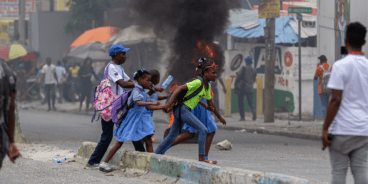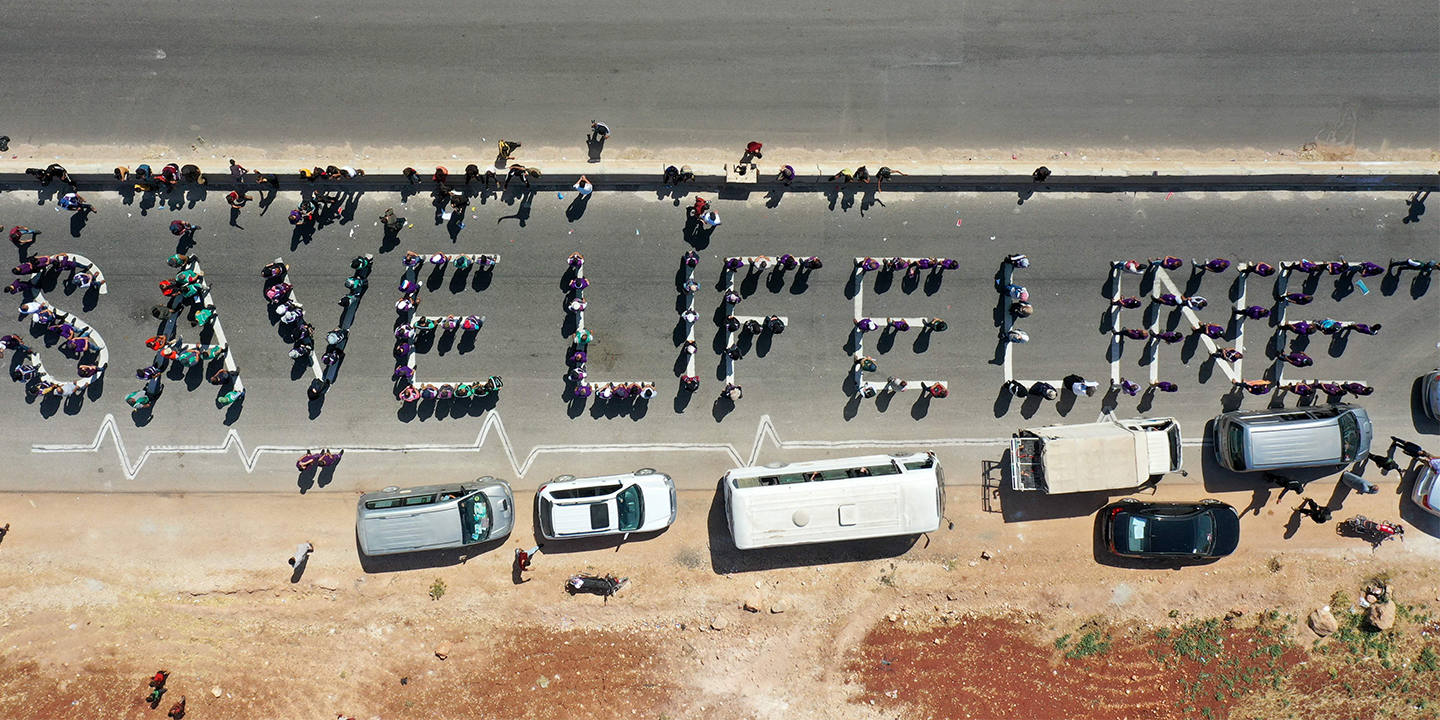

Atrocity Alert No. 260: Syria, Central African Republic and South Sudan
Atrocity Alert is a weekly publication by the Global Centre for the Responsibility to Protect highlighting situations where populations are at risk of, or are enduring, mass atrocity crimes.
UN SECURITY COUNCIL VOTES ON LAST HUMANITARIAN LIFELINE TO NORTHERN SYRIA
A decade of war in Syria has left 13.4 million people dependent on humanitarian aid. Syrians are now experiencing record levels of food insecurity and economic hardship, as well as added threats resulting from the COVID-19 pandemic, with the number of people requiring humanitarian assistance growing by 20 percent in 2020. Years of airstrikes and other unlawful attacks targeting hospitals and clinics has also crippled what remains of Syria’s healthcare infrastructure. Millions of people who are still living in areas outside government control are now almost entirely dependent on cross-border aid deliveries for survival.
Despite the desperate plight facing millions of Syrians, the UN Security Council (UNSC) is currently unable to reach a consensus on continuing the delivery of life sustaining aid ahead of the 10 July expiration of the “cross-border mandate.”
The UNSC first authorized cross-border deliveries in 2014, creating four points through which humanitarian aid could be delivered by road from Turkey, Iraq and Jordan. However, since then, Russia – a permanent member of the UNSC and close ally of the Syrian government –has called for the cessation of cross-border humanitarian operations, insisting that aid should be delivered via Damascus instead. Last year, due to Russian pressure and several joint vetoes with China, the UNSC reduced the number of cross-border delivery points from four to one. Bab al-Hawa, on the northwest border with Turkey, is currently the only point through which crucial aid is allowed to be delivered to people in northern Syria.
A draft resolution currently being negotiated by the UNSC calls for the renewal of two crossings – Bab al-Hawa in the northwest and Al Yarubiyah in the northeast – for twelve months. Russia has reportedly called the draft “a non-starter” and did not participate in negotiations regarding the resolution on 6 July.
At a UNSC meeting on 23 June the acting UN Under-Secretary-General for Humanitarian Affairs and Emergency Relief Coordinator, Ramesh Rajasingham, highlighted that “there is simply no substitute for the cross-border operation.” UN Secretary-General António Guterres also warned the UNSC that a failure to extend cross-border aid operations “would have devastating consequences.”
Humanitarian experts continue to emphasize that at least three border crossings, including Bab al-Salam in the northwest, must be renewed in order to meet current humanitarian needs. Ambassador Linda Thomas-Greenfield, Permanent Representative of the United States to the UN, said that, “since the closing of Bab al-Salam, not a single cross-line convoy has succeeded in reaching Idlib… There are places in Syria that haven’t seen a cross-line shipment in 18 months.” Meanwhile, Syrian government forces, as well as some armed opposition groups, continue to harass aid workers and obstruct their work. More than 275 humanitarian workers have been killed in Syria since 2011.
The UNSC should immediately authorize at least three crossing points at Bab al-Hawa, Bab al-Salam and Al Yarubiyah. Anything less would be an abdication of the UNSC’s responsibility to protect and condemn millions of Syrians to needless suffering.
FOREIGN MERCENARIES THREATEN CIVILIANS IN CENTRAL AFRICAN REPUBLIC
Ongoing armed clashes in the Central African Republic (CAR) leave civilians at grave risk of further atrocities. On 28 June the UN Special Adviser on the Prevention of Genocide, Alice Wairimu Nderitu, expressed concern over the situation, stating that the country “has witnessed increasing human rights violations, targeted violence against communities and forced displacement of civilians committed by armed groups, government forces and bilaterally deployed security personnel, which could contribute to risks of atrocity crimes.”
Civilians in CAR – especially in the west, northwest and center of the country – have experienced increased violence and widespread violations of International Humanitarian Law (IHL) since a coalition of armed groups launched an offensive last December aimed at overthrowing the government. Since then, the Central African Armed Forces (FACA) – working closely with Russian mercenaries, acting as “military instructors” – have launched a counter-offensive against the coalition and other armed groups.
According to the 25 June report of the UN Panel of Experts on CAR, various armed groups are continuing to forcibly recruit child soldiers, attack humanitarian workers and the UN peacekeeping force in CAR (MINUSCA), and perpetrate sexual violence. The UN Office for the Coordination of Humanitarian Affairs reported that some armed groups are also blocking people trying to flee violence in Ouham-Pendé prefecture and are attacking displaced persons.
However, most of the 82 conflict-related civilian deaths recorded by MINUSCA between February and May this year were caused by FACA and “bilaterally deployed and other security personnel.” Russian military instructors and FACA troops are also reportedly responsible for torture, the occupation of schools and the looting of humanitarian organizations. They have also increased the stigmatization of ethnic and religious minorities, especially Muslim communities. Despite the UN report, Russia has deployed an additional 600 military instructors to CAR, bringing the estimated total to over 2,000 personnel.
All parties to the conflict must abide by their obligations under IHL and end attacks on civilians and humanitarian workers. All perpetrators of atrocity crimes in CAR should be held legally accountable, regardless of their rank, affiliation or nationality.
SOUTH SUDAN’S FIRST DECADE MARRED BY CATASTROPHIC CIVIL WAR AND ONGOING VIOLENCE
This Friday, 9 July, marks the tenth anniversary of South Sudan’s independence. For much of its first decade of existence as a sovereign state, South Sudan has experienced a devastating civil war and widespread atrocities. Between December 2013 and August 2015 an estimated 400,000 people were killed as the Sudan People’s Liberation Army (SPLA) and armed rebels from the opposition SPLA-IO perpetrated war crimes and crimes against humanity, including extrajudicial killings, torture, child abductions and sexual violence. Despite the signing of numerous peace agreements between 2015 and 2018, intermittent fighting and ethnic violence continued.
Despite a September 2018 peace agreement that finally ended the civil war, South Sudan is currently facing the highest levels of food insecurity and malnutrition since its independence. An estimated 7.2 million people – 60 percent of the population – are likely to face acute food insecurity this year. Almost 3.9 million people remain displaced by the civil war, including 2.2 million people who fled to neighboring countries. Commenting on this year’s anniversary, the Executive Director of the UN Children’s Fund, Henrietta Fore, said that, “the hope and optimism that children and families in South Sudan felt at the birth of their country in 2011 have slowly turned to desperation and hopelessness.”
In his briefing to the UN Security Council on 21 June, the UN Special Representative for South Sudan, Nicholas Haysom, said that, “pervasive insecurity, in particular inter-communal violence, continues to obstruct the realization of a durable and sustainable peace in South Sudan.” Slow implementation of the 2018 peace agreement, as well as the mobilization of forces along ethnic lines and internecine power struggles within the government, has led to a sharp increase of localized and inter-communal violence in various parts of the country.
Interminable delays in implementing key provisions of the 2018 peace agreement must be overcome. The Transitional Government of National Unity (TGoNU) must confront endemic corruption, overcome perceptions of ethnic favoritism, and set out a human rights agenda that includes much-needed reforms to the security sector. The TGoNU must also end impunity for past atrocity crimes and hold perpetrators accountable, including through operationalizing the long overdue Hybrid Court for South Sudan. After a decade of independence, the people of South Sudan deserve the peace, justice and security that their leaders promised them and have tragically failed to deliver.
Related Content


Expert Voices on Atrocity Prevention Episode 43: Adama Dieng
